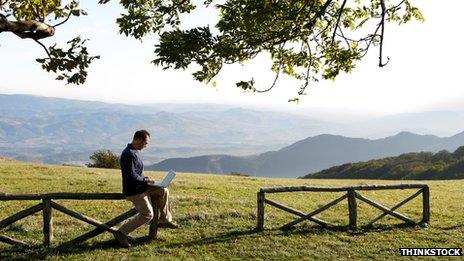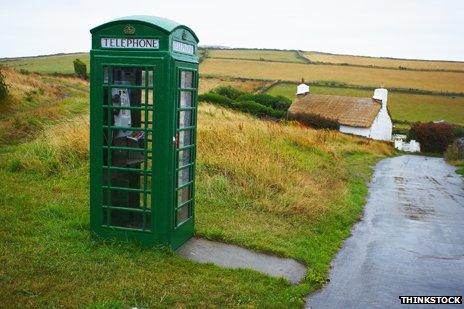Rural broadband - a 4G solution?
- Published
- comments

This week has seen MPs slam the government's rural broadband project as delivering poor value to the taxpayer - and an equally robust response from ministers and from BT.
Their defence of the programme which has put the entire project in the hands of one company was that nobody else was willing or able to do it.
But here's a thought - was the government too narrow-minded in deciding that fixed line fibre optic broadband was the only way to hook up remote areas to the 21st Century? Two of the big mobile operators, EE and Vodafone, certainly seem to think so. They both came out with statements urging the government to use 4G as a solution.
"The current BDUK process simply will not deliver value for money nor the rural connectivity that Britain needs," said Vodafone. "The government should urgently revise the process to encompass wireless 4G in order to make digital Britain a reality."
I asked both companies why they had not got involved in the bidding process from the start, offering BDUK (the government agency handling the superfast broadband rollout) an alternative to BT. But they insist that the rules for the process made it clear that mobile broadband would not be considered as an option.
So should it have been? BDUK's aim was to deliver superfast broadband to 90% of the population by 2015 - and we know that this target has slipped a little. But the three big mobile operators say they will deliver indoor 4G coverage to 98% of the population by 2015. Now in some areas 4G speeds may be quite a bit slower than what a fibre connection can promise - but the mobile service may arrive sooner and at less cost to the taxpayer.
In Cumbria for instance, EE is already providing a 4G service in the Northern Fells, an area which won't see the benefit of the £40m invested under the BDUK programme for another couple of years.
To stop the programme in its tracks now and re-open the bidding process might well bring further chaos and delays - but the mobile operators see a chance to to get their hands on some of the money which has not yet been spent. There will be pressure on BT to be far more clear about which areas will not be served even when the fibre rollout is complete - and on the government to invite others to complete the job.

Still the fastest signal for miles?
And another thing...
When I wrote last week about my frustration that the arrival of 4G in my area did not seem to have done anything to improve my 3G reception, a few people got in touch to accuse me of technical illiteracy. They pointed out, quite rightly, that 4G and 3G are different technologies.
But my point was that the networks had promised that everyone would benefit from 4G's arrival - and today O2 confirmed that this was the plan. Whenever they install a 4G mast, they will also upgrade the 3G equipment, a spokeswoman told me. The end result will be that the current figure of 84% population coverage for 3G will rise to 98%, matching the 4G pledge.
The company stressed, however, that this would not happen overnight. Like those waiting for rural broadband, anyone expecting a rapid improvement in mobile coverage may have to be patient.